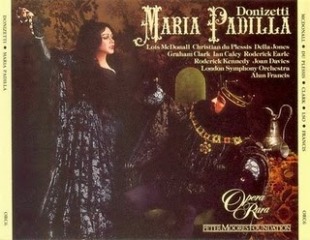Gaetano Donizetti – Maria Padilla (1998)
Gaetano Donizetti – Maria Padilla (1998)

Act I:
01. Di Queste Ridente
02. Al Vostro Puro Omaggio
03. Elan Gia Create In Cielo
04. Soridi, Oh Sposo Amato
05. Ad Affrettar Vo Il Sacro Riti
06. Diletta Suora
07. Il Piu Tenero Suon D’Arpa
08. Ah! Non Sai Qual Prestigio play
09. Don Alfonso Di Pardo
10. Lieto Fra Voi Ritorno
11. Oh Coppia Diletta
12. Diletta Suora … Ella E Felica
13. Ecco! Lanciar Le Corde
14. Core Innocente E Giovane
15. Oh. Mio Padre
16. A Te Oh Caro M’abandono
Act II:
01. Nella Regia Dell’Amore
02. Quale Doppo Tant’anni
03. Il sentiero Di Mia Vita
04. Una Gioja Ancor Mi Resta
05. Ines. Mia Dolce Suora play
06. A Figlia Incauta
07. Ah Si! Suora
08. Alla Regina Madre
09. Io Ti Vedo Alla Fin Quest’Augusto
10. Sovra Il VilChe M’ha Insultato
11. Vada, Soffra Quel Protervo
12. Mio Padre
Act III:
01. E Quiete Profonda
02. Oh Figlia
03. Su Quelle Fronte Dal Dolore
04. Padre Oh Rio Dolore
05. Attemdi! E Quola … senti
06. Provo Si Tenti Estrema
07. Uno Sguardo, Un Detto play
08. Come Rosa Que S’apre
09. Ora Fatal
10. Ah! Quello Fu Per Me
11. Vedi La Regina S’avanza!
12. Lasciar Maria
13. Qualo’astro Novello
14. Don Pedro Alto Sovrano
15. Giurata Innanzi A Dio
16. Sento Ad Ognor Estinguersi
17. Il Silenzio In Che T’ostini
18. O Padre Tu L’odi
Maria - Lois McDonall Ines - Della Jones Ruiz - Graham Clark Pedro - Christian Du Plessis Ramiro - Roderick Earle Francisca - Joan Davies Luigi - Ian Caley Alfonso - Roderick Kennedy Geoffrey Mitchell Choir London Symphony Orchestra Alun Francis - conductor
Maria Padilla is a melodramma, or opera, in three acts by Gaetano Donizetti. Gaetano Rossi and the composer wrote the Italian libretto after François Ancelot's play. It premiered on December 26, 1841 at La Scala, Milan. The plot is loosely based on the historical figure María de Padilla, the mistress of Pedro the Cruel, King of Castile.
Donizetti is known for being a great melodist, but not for infusing his operas with unique musical atmosphere. Maria Padilla is a surprise for those who think Donizetti predictable. Written in 1841 near the end of his career, it is clear evidence of the composer's search for dramatic realism. From the first notes played by the orchestra to the last, we could never believe the action was taking place anywhere but in Spain. There are the usual 2-part arias with florid cabalettas, but Donizetti also experiments with musical forms and part allocation. He expands a baritone aria into a sextet, and assigns the part of Maria's old father to a tenor (who steals the right of a mad scene from the soprano!). The music is thrilling from beginning to end. In particular, a soprano-mezzo duet is on a par with its more famous counterpart in Norma, and the duet for Maria and her father is intensely dramatic. The final aria completely makes up for a dramatically unsatifying happy ending, giving the soprano ample opportunity to completely bring down the house. A thick booklet contains an English-Italian libretto, a well-researched and interesting scholarly article by Jeremy Commons, and a plot synopsis. A great opportunity to explore some of the forgotten byways of Italian Opera, and a thoroughly enjoyable recording. ---Dwadefoley
c
Maria Padilla deserves to be better known. It is fairly late Donizetti in which the composer has developed his own distinctive elements and furthermore is showing a good deal of affinity to Bellini. He was not breaking out in new ways or generating promising extensions to the bel canto approach, as Mercadante was doing at that period and as Verdi, in a different way, soon would be doing. The music is never less than engaging, and at times reaches outstanding levels, particularly in the second act soprano duet but also at many other points. The opera is probably almost never performed because of a weak libretto and the fact that there are enough good Donizetti operas that few companies need to venture off the beaten track even for strong works -- and this is at least as strong as Roberto Devereaux, for example. The recorded sound is more than adequate, inhancing rather detracting from the performance. One does wonder how much more this operatic jewel would glitter if it had some really great singers and interpreters involved. In their absense, this is a highly worthwhile set. ... ---John Cragg
download: uploaded anonfiles yandex 4shared solidfiles mediafire mega filecloudio
Zmieniony (Czwartek, 31 Październik 2013 21:14)








